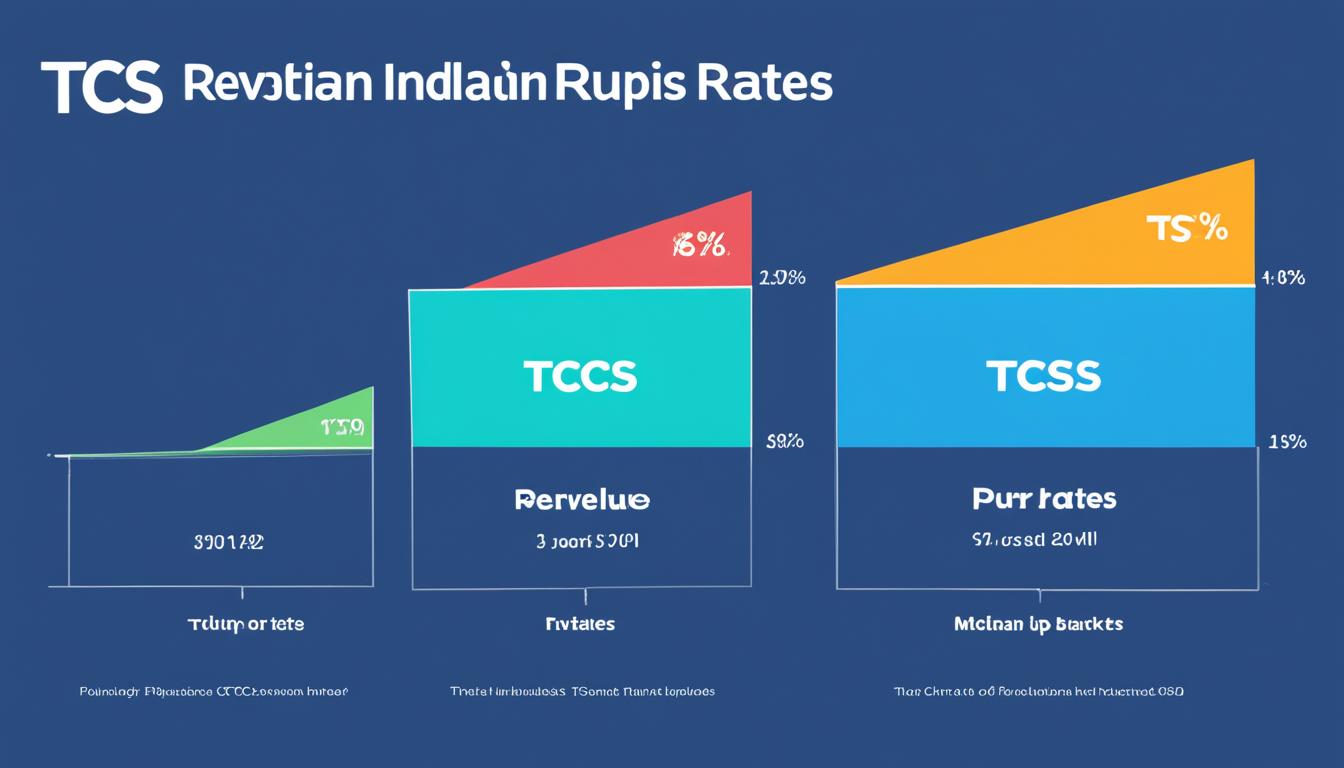Hyderabad , India
Have you ever thought about how Tax Collected at Source (TCS) affects Indian startups? TCS rates are key to our e-commerce sector’s growth. At Am Accountable, we offer virtual accounting services for startups in India. We help you understand TCS and build a strong financial base for your business.
The Indian tax system requires sellers to collect certain taxes on goods and services. Knowing about TCS helps startups manage their finances better and stay in line with the law. For e-commerce, this means taking TCS from buyers when they make purchases. This way, everyone pays their share, making the market fair for all.
Understanding TCS is key for startups to manage their money well. It’s important to know the different TCS rates and how to follow the rules. For more details on TCS rates, including when they’re due and how to get refunds, check out this helpful article on TCS rates on sale of goods.
Key Takeaways
- TCS directly affects cash flow, requiring startups to adapt their pricing strategies.
- Understanding TCS can prevent costly compliance issues down the road.
- Awareness of specific TCS rates across goods is essential for accurate financial planning.
- Keeping track of quarterly TCS returns is necessary to maintain compliance.
- Refund procedures are in place for any excess TCS collected from buyers.
- Staying updated on changing TCS regulations is crucial for ongoing financial health.
What is TCS?
Tax Collected at Source (TCS) is a key part of India’s tax system. It means sellers collect tax from buyers during sales, for specific goods and services. This tax goes straight to the government, making tax collection easier and following rules better. TCS puts the tax duty on sellers to make the market more transparent and responsible.
Starting October 1, 2023, TCS will affect many areas. For sending money abroad over Rs 7 lakh in a year, a 20% TCS will apply. But, sending money for school costs under Rs 7 lakh is free from TCS. If you get a loan for sending money, and it’s over Rs 7 lakh, you’ll pay 0.5% TCS. Without a loan, it’s 5%. Sending money for health care over Rs 7 lakh also gets a 5% TCS.
Buying tour packages from other countries also has its tax rules. A 5% TCS is charged for packages up to Rs 7 lakh, and 20% for packages over that. These rules show how taxes are getting stricter for international deals. It’s important for businesses to keep up with these changes.
Knowing about TCS is key for following the law and planning your finances well. We suggest startups keep up with TCS rules and talk to experts in Indian taxes. For tips on starting a business in India, check out this resource.
Who Should Be Aware of TCS?
TCS awareness is key for many, especially in the fast-paced e-commerce world. E-commerce sellers, especially those running startups, need to grasp TCS rules well. These rules affect businesses using big names like Amazon and Flipkart. They take TCS from sellers before paying them out.
This rule covers vendors, small businesses, and anyone selling online. Knowing TCS can change how startup founders run their businesses. For example, a 0.5% tax is applied to sales within and outside the state. It’s crucial to pay this tax by the end of the month.
Also, knowing about GSTR-8 filing for e-commerce sellers is important. This keeps businesses in line with their duties.
Getting the hang of TCS is key for good cash flow. TCS can hold back working capital for small e-commerce businesses until they get back their tax claims. Our team at Am Accountable helps startups with these issues. We provide virtual accounting services for Indian startups, helping entrepreneurs set up a virtual accounting team in just 24 hours. For more info, call us at +91 91778 42756.
The Significance of TCS for E-commerce
TCS is crucial in the fast-growing world of e-commerce in India. It makes sure transactions are clear and trustworthy. This supports startups and helps them understand their tax duties.
For startups, TCS has a big impact. It affects how they set prices and manage money. Knowing about TCS is key, especially since they must pay taxes on time. The TCS rate for Indian startups has dropped to 0.5%, helping new businesses a lot. Following these rules helps firms stay financially strong.
Platforms like Amazon and Flipkart play a big role in collecting TCS. They help bring in a lot of tax money, fighting evasion and growing the tax base. Being quick to report and pay taxes is crucial for everyone. Understanding TCS helps improve business and makes sure we can grow in the digital market.
How Does TCS Work?
TCS mechanisms are key in collecting taxes right at the start of e-commerce sales. They make sure taxes are paid early on. Let’s look at a seller who sells a product for Rs. 1,000 with a TCS rate of 1%. The e-commerce site takes out Rs. 10 as tax automatically. It then gives Rs. 990 to the seller and sends Rs. 10 to the government.
This way, TCS is easily added to sales, making things clear and efficient. It makes tax collection easier for sellers online. By taking out TCS when they sell, the e-commerce site handles the tax payment. This makes things run smoother for sellers. TCS helps collect more taxes for the government as online sales grow in India.
Key TCS Rates for Indian Startups
For Indian startups, knowing about TCS rates is crucial. These rates play a big role in financial planning and tax compliance. It’s key to have a clear understanding of TCS rates for good management.
Overview of TCS Rates
The Central Board of Direct Taxes sets different TCS rates for various goods and services. Knowing these rates helps startups plan for taxes. Important rates include:
- 1% for alcoholic liquor for human consumption
- 2.5% for timber products
- 1% for minerals like coal and iron ore
Staying updated on TCS rates helps startups set prices and stay compliant with taxes.
Common Goods and Their TCS Rates
Here’s a table showing common goods and their TCS rates.
| Goods/Services | TCS Rate |
|---|---|
| Alcoholic Liquor for Human Consumption | 1% |
| Timber | 2.5% |
| Minerals (Coal, Iron Ore) | 1% |
| Overseas Tour Packages | 5% (up to Rs 7 lakh), 20% (exceeding Rs 7 lakh) |
| International Credit Card Payments | 20% (above Rs 7 lakh) |
This info helps startups understand TCS rates better. It shows how important these rates are for E-commerce Goods Taxation. Knowing them helps in making smart financial decisions and avoiding tax issues.
TCS Rates for Indian Startups
The world of TCS for Startups in India is always changing, especially for e-commerce businesses. It’s key to know the tax rates and rules to stay in line and plan better. New companies making things get a special tax rate of 15% until March 31, 2024. This is for companies that started making things after October 1, 2019.
These new companies might pay as much as 17.16% tax, which affects prices and profits. We need to think about these rates and how rules might change our plans. Experts say not extending the special tax rate might not affect much now, but could be a problem for investments later.

Also, TCS on sending money out has made things more complicated. If you send more than Rs 7 lakh a year, you’ll pay 20% TCS. This includes money sent for foreign investments or education, so managing money well is key to staying legal and keeping cash flow good.
| Type of Remittance | Threshold (Rs) | TCS Rate |
|---|---|---|
| Overseas Outward Remittances | Above 7 lakh | 20% |
| Educational Purposes (Loan) | Above 7 lakh | 0.5% |
| Educational Purposes (No Loan) | Above 7 lakh | 5% |
| Medical Treatment | Above 7 lakh | 5% |
| Overseas Tour Packages | Up to 7 lakh | 5% |
| Overseas Tour Packages | Above 7 lakh | 20% |
| Foreign Investments | Above 7 lakh | 20% |
Startups need to understand these complex tax rates and follow the rules. Knowing about TCS helps with planning money and making smart choices. This way, we can grow and succeed.
Impact of TCS on Cash Flow for Startups
The recent changes to Tax Collected at Source (TCS) have big effects on startups. They now face a 20% TCS rate, up from 5%. This change means more financial strain for startups using corporate credit cards for international deals. It can really cut into their working capital.
Understanding the Immediate Financial Implications
Startups often see less money because of TCS deductions. They also have to deal with more compliance costs and keep up with changes. For example, the annual limit for cross-border transactions under the Liberalised Remittance Scheme is still $2,50,000. But now, all these transactions have a 20% TCS. This makes it harder to keep enough cash on hand and makes Startup Financial Management more complex.
Long-term Effects of TCS on Financial Planning
Understanding TCS is key for good Tax Planning in the long run. Startups might need to adjust their prices to manage cash better. By planning for TCS, we can keep our cash flow steady. This helps us manage our finances better and stay ready for compliance. Using new strategies helps keep our cash flow stable and boosts our financial health.
| Aspect | Short-term Impact | Long-term Impact |
|---|---|---|
| Cash Flow | Reduced liquidity due to higher TCS deductions. | Need for reevaluation of pricing strategies to maintain adequate cash flow. |
| Compliance Costs | Increased costs and time in tracking transactions. | Ongoing need for resources dedicated to compliance management. |
| Financial Health | Pressure on working capital, affecting operational effectiveness. | Potential for enhanced financial planning to avoid liquidity crises. |
At Am Accountable, we offer virtual accounting services for startups in India. We focus on new solutions to make finance easier and follow TCS rules well. With our help, startups can grow without worrying about their Startup Financial Management. Call us at +91 91778 42756 to see how we can help you manage TCS impacts.
How to Manage TCS as a Startup
Managing Tax Collected at Source (TCS) is crucial for startups. It helps us deal with financial rules. Using smart TCS Management Strategies can really help our profits. By choosing the right Pricing Tactics, we can keep our profits up while following tax laws. Keeping accurate records and using Accounting Technology helps with tax and financial planning.
Effective Pricing Strategies
We need to adjust our prices to include TCS costs. This keeps our business profitable. We should think about the tax rates for our products or services. Doing this helps us avoid losing money and be clear with our customers.
Maintaining Accurate Sales Records
Keeping detailed sales and transaction records is key for tax reporting. A good system helps us track TCS-related sales easily. This clear documentation helps us follow the rules and prepares us for audits.
Utilizing Technology for Compliance
Using Accounting Technology changes how we handle TCS. Automated TCS calculators and special software make following the rules easier. This tech helps us stay compliant and saves time and money.
| Strategy | Description |
|---|---|
| Pricing Adjustments | Modify pricing to factor in TCS implications, ensuring profitability. |
| Record-Keeping | Establish a detailed sales recording system to assist in tax reporting. |
| Tech Adoption | Use accounting software and TCS calculators to streamline compliance. |
| Staff Training | Educate team members on TCS processes and procedures. |
| Regular Audits | Conduct periodic checks to ensure compliance with TCS regulations. |
Understanding State vs. Central TCS Application
When it comes to Tax Collected at Source (TCS), knowing the difference between State and Central TCS is key for startups. This is especially true for those in E-commerce and dealing with Tax Jurisdiction. In one state, TCS is split between the state and the central government. This way, tax money is shared fairly.
But, things change when sales cross state lines. Then, TCS falls under the Integrated Goods and Services Tax (IGST). It’s important for startups to know this to stay in line with the law and avoid fines.
Startups need to keep an eye on their TCS duties by tracking sales and knowing the rates. For example, the 2023 Budget upped the TCS on foreign money sent back to India from 5% to 20% for amounts over Rs 7 lakh. This shows why it’s crucial to stay updated on TCS changes that affect costs.
The table below shows the TCS rates for different goods. It shows the rules startups must follow:
| Goods/Services | TCS Rate |
|---|---|
| Alcoholic liquor for human consumption | 1% |
| Tendu leaves | 5% |
| Timber (obtained under a forest lease) | 2.5% |
| Timber (obtained by any means other than under a forest lease) | 2.5% |
| Scrap | 1% |
| Minerals (like lignite, coal, iron ore) | 1% |
| Remittance out of India (over Rs 7 lakh) | 20% (from Oct 1, 2023) |
| Sales of overseas tour packages | 5% |
| Any other goods (excluding specific categories) | 0.10% |
By understanding the differences between State and Central TCS, startups can handle taxes better. Knowing the rules helps us work more efficiently and avoid tax problems.
Potential Challenges for Startups Regarding TCS
Startups in India face many TCS Challenges that can affect their work. It’s crucial to handle compliance issues well, as tax rules change often. If tax rules are not understood correctly, it can cause mistakes in calculations. This can harm both the financial health and growth of the startup.
Common Mistakes to Avoid
It’s key to spot and fix common TCS mistakes to keep cash flow and work running smoothly. A big mistake is not including TCS in pricing plans. This can make profits go down and cause cash flow problems. Other mistakes include:
- Failing to keep accurate sales records, which can lead to discrepancies.
- Not making timely tax payments, which results in penalties.
- Not keeping up with changes in tax laws related to TCS.
Preparing for Tax Audits
Getting ready for tax audits is important to avoid compliance risks. We need to make sure our records are well-organized and complete. Here are some ways to be ready for audits:
- Setting up strong controls for tracking sales and keeping documents.
- Checking often to make sure we follow TCS rules well.
- Working with accountants who know a lot about tax for startups to help us get ready.
Knowing about these challenges helps us make plans to stay compliant and manage our finances well. Improving how we handle TCS issues will help our startups work better and grow steadily.
Staying Updated on TCS Regulations
In the fast-changing world of Indian tax laws, startups must keep a close eye on TCS Regulation Updates. It’s crucial to follow the latest tax news to avoid any compliance problems. By checking the GST website and financial news regularly, we can keep up with tax policy changes that might affect us.
Talking to tax experts gives us a big boost. They help us understand complex rules and make sure we follow E-commerce Compliance Strategies. These strategies help us stay in line with the law and be ready for any new rules quickly.
Knowing about TCS is more than just following the rules. Joining discussions and forums about TCS and other regulations lets us connect with other startups. We can share tips and learn from each other, which helps shape our financial plans. Staying up to date with government policies and startup support programs gives us an edge in the market.
| Aspect | Importance |
|---|---|
| Regular Monitoring | Stay aware of changes in TCS regulations |
| Engagement with Tax Professionals | Receive tailored advice and compliance support |
| Participation in Discussions | Gain insights from the wider startup community |
| Compliance Strategies | Implement effective approaches for e-commerce |
By focusing on these areas, we can master the details of TCS and set our startups up for success in a changing market.
Conclusion
Understanding TCS rates is key for startups in India’s financial world. With over 99,000 recognized startups, the need for Startup Financial Planning grows. Managing Tax Collected at Source well helps us handle cash flows better, helping our startups succeed.
At Am Accountable, we offer custom consulting services for startups. We help our clients follow tax rules well. The changes in TCS rates show why staying updated and proactive is crucial. By planning well for these financial tasks, startups can do well over time.
We help startups build a virtual accounting team in just 24 hours. This makes their work smoother, saves time, and cuts costs. As we work on TCS together, we make sure our clients can handle their finances well. This helps them grab chances for growth in this fast-changing market.
FAQ
What is TCS and why is it important for startups?
TCS stands for Tax Collected at Source. It’s a tax collected by online sellers during sales. It’s key for startups as it makes tax easier, keeps them in line with the law, and ensures fair competition.
Who is required to be aware of TCS regulations?
All online sellers, especially startup owners, need to know about TCS rules. This includes small and medium businesses and anyone selling through digital platforms like Amazon and Flipkart.
How does TCS affect pricing strategies for startups?
TCS can change how startups set prices by lowering the money they get from sales. Startups must think about TCS rates when setting prices to keep their profits and manage their money well.
What are the common TCS rates applicable to various goods?
TCS rates vary by product. For instance, it’s 1% for drinks, 2.5% for timber, and 1% for certain minerals like coal and iron ore. Startups need to know the rates for their products.
What are some common mistakes startups make regarding TCS?
Startups often make mistakes like not factoring in TCS in their prices, miscalculating TCS amounts, and not keeping good records. These errors can cause trouble during audits.
What technologies can assist startups in managing TCS compliance?
Startups can use accounting software, automated TCS calculators, and digital tools to make managing TCS easier. These tools help with accurate reports and handling taxes better.
How do state and central TCS applications differ?
TCS rules change depending on where you’re selling. For sales within a state, TCS goes to both the state and central governments. For sales across states, it’s under the Integrated Goods and Services Tax (IGST). Knowing these rules is crucial for following the law.
Why is it essential for startups to stay updated on TCS regulations?
Tax rules change often, and keeping up with TCS updates helps startups adjust their plans. It keeps them in line with the law, reduces risks from audits and fines, and helps them grow.








